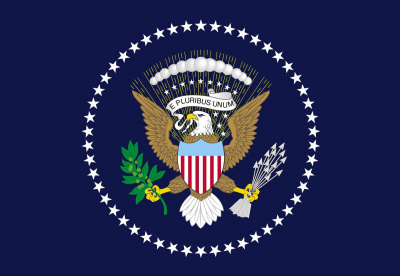The weekly address of the president of the United States (also known as the Weekly (Radio) Address or Your Weekly Address) is the weekly speech by the president of the United States to the nation. Franklin D. Roosevelt was the first U.S. president to deliver such radio addresses. Ronald Reagan revived the practice of delivering a weekly Saturday radio broadcast in 1982, and his successors all continued the practice until Donald Trump ceased doing so seventeen months into his term.
As the Internet became mainstream during the 1990s, the weekly address was made available on other media. George W. Bush introduced an audio podcast feed and Barack Obama introduced a weekly video address during his presidential transition period. Donald Trump continued the weekly video address for the first nine months of his administration, after which he ended the practice. He later released occasional "weekly" addresses before ceasing the tradition in June 2018.Joe Biden revived the practice of making a weekly address in February 2021 in the form of Weekly Conversations, answering prepared questions or concerns from citizens. As vice president, Biden made weekly addresses on behalf of Barack Obama during the Obama administration.
The president of the United States (POTUS) is the head of state and head of government of the United States of America. The president directs the executive branch of the federal government and is the commander-in-chief of the United States Armed Forces.
The power of the presidency has grown substantially since the office's establishment in 1789. While presidential power has ebbed and flowed over time, the presidency has played an increasingly strong role in American political life since the beginning of the 20th century, with a notable expansion during the presidency of Franklin D. Roosevelt. In contemporary times, the president is also looked upon as one of the world's most powerful political figures as the leader of the only remaining global superpower. As the leader of the nation with the largest economy by nominal GDP, the president possesses significant domestic and international hard and soft power.
Article II of the Constitution establishes the executive branch of the federal government and vests the executive power in the president. The power includes the execution and enforcement of federal law and the responsibility to appoint federal executive, diplomatic, regulatory, and judicial officers. Based on constitutional provisions empowering the president to appoint and receive ambassadors and conclude treaties with foreign powers, and on subsequent laws enacted by Congress, the modern presidency has primary responsibility for conducting U.S. foreign policy. The role includes responsibility for directing the world's most expensive military, which has the second largest nuclear arsenal.
The president also plays a leading role in federal legislation and domestic policymaking. As part of the system of checks and balances, Article I, Section 7 of the Constitution gives the president the power to sign or veto federal legislation. Since modern presidents are also typically viewed as the leaders of their political parties, major policymaking is significantly shaped by the outcome of presidential elections, with presidents taking an active role in promoting their policy priorities to members of Congress who are often electorally dependent on the president. In recent decades, presidents have also made increasing use of executive orders, agency regulations, and judicial appointments to shape domestic policy.
The president is elected indirectly through the Electoral College to a four-year term, along with the vice president. Under the Twenty-second Amendment, ratified in 1951, no person who has been elected to two presidential terms may be elected to a third. In addition, nine vice presidents have become president by virtue of a president's intra-term death or resignation. In all, 45 individuals have served 46 presidencies spanning 58 full four-year terms.Joe Biden is the 46th and current president of the United States, having assumed office on January 20, 2021.

2001Sep, 15
President George W. Bush gives his first post September 11th weekly address.
Choose Another Date
Events on 2001
- 6May
Pope John Paul II
During a trip to Syria, Pope John Paul II becomes the first pope to enter a mosque. - 11Sep
September 11 attacks
Two hijacked aircraft crash into the World Trade Center in New York City, while a third smashes into The Pentagon in Arlington County, Virginia, and a fourth into a field near Shanksville, Pennsylvania, in a series of coordinated suicide attacks by 19 members of al-Qaeda. A total of 2,996 people are killed. - 14Sep
September 11, 2001 attacks
Historic National Prayer Service held at Washington National Cathedral for victims of the September 11 attacks. A similar service is held in Canada on Parliament Hill, the largest vigil ever held in the nation's capital. - 17Sep
September 11 attacks
The New York Stock Exchange reopens for trading after the September 11 attacks, the longest closure since the Great Depression. - 7Oct
War in Afghanistan (2001-2014)
The Global War on Terrorism begins as a result of the September 11 attacks. The U.S. invasion of Afghanistan initiates with an air assault and covert operations on the ground.

 English
English  español
español  français
français  português
português  русский
русский  العربية
العربية  简体中文
简体中文 